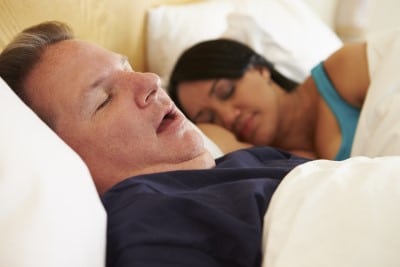
Can snoring really cause a sore throat? – Why it might and 12 ways to prevent it
By Jason Wooden, PhD
While bacterial and viral infections are the most common cause, snoring is frequently associated with a sore throat. Snoring can physically irritate and inflame the throat lining to trigger a sore throat. It may also aggravate a throat already sore from other causes.
If you suspect snoring is the cause of your sore throat, there’s a wide range of snoring remedies ranging from sleep position changes to medical devices. There’s also a wide choice of meds and natural remedies to help you feel better and recover.
If you’re wondering whether snoring can cause a sore throat, it’s understandable since waking up in the morning with a scratchy throat is a rough way to start the day.
Did you know that 40% of adult men and 24% of adult women are habitual snorers?
With so many people “sawing logs” night after night, there are bound to be some who wake up with sore throats in the morning and wonder if snoring is the cause.
A sore throat, also known as pharyngitis, is caused by inflammation of the pharynx, the area at the back of your throat.
It’s one of the top reasons to see a doctor and 11 million people ared diagnosed with pharyngitis each year in the US alone.
And, whether it’s mild discomfort or a full-blown burning pain, a sore throat can also make it harder to swallow.
Let’s take a look at what we know about the connection to snoring and what you can do about it.

What happens when you get a sore throat?
Before we get into the link to snoring, let’s talk a bit about what’s going on when you get that scratchy sore throat feeling.
It’s all about inflammation.
When the back of your throat is inflamed during a sore throat, it reddens, the tonsils may secret pus and become swollen, and it can become painful to talk or swallow.
There are many different things that can inflame the mucous lining and cause a sore throat.
The most common cause is infections from viruses and bacteria, and in some cases fungal infections.
Chemical irritation from things like smoking and drugs can also inflame the throat.
And, physical irritation from things like shouting or air conditioning can cause a sore throat, which brings us back to snoring…

Yes, snoring really can cause a sore throat
Okay, now that we know what’s happening when you get a sore throat, what you really want to know is whether snoring can inflame the back of your throat, right?
To begin with, snoring comes from the back of the throat and nose. It happens when air flowing through your mouth and nose is blocked. As you breathe, the tissues in your throat vibrate resulting in that loud and annoying noise.
It turns out snoring is frequently associated with a sore throat -it’s one of the known physical irritants.
It’s also likely, that snoring can increase your risk or aggravate a minor sore throat from other causes, leading to a knock-down, drag-out battle to recover.
And, it your snoring is caused by obstructive sleep apnea, you’re at increased risk for inflammation in your airway.
(It’s a common sleep disorder in which breathing is interrupted during the night due to collapse of the airway. You can read more about it here.)
The respiratory tracks of obstructive sleep apnea patients tend to be really stressed out and they often sleep with their mouths open.
They also commonly have upper airway inflammation. In fact, in studies, sleep apnea severity has been found to correlate with high levels of inflammation – the worse your sleep apnea is the more inflammation found in the body.
So, if you a snoring sleep apnea patient, the back of your throat is likely super inflamed and more prone to sore throats.
What this all means is that if you snore it’s quite possible it can give you a sore throat and it can aggravate a throat already inflammed from other causes.

How can I keep snoring from giving me a sore throat?
If you suspect your snoring is the cause of your morning sore throats, here’s a bit of good news – you have plenty of options to try.
1) Sleep hygiene
Being sleep deprived and overtired can increase your risk for snoring. That makes it important to make sure you’re getting as much quality rest as you can every night.
Sleep hygiene is what you do during the day, evening, and at night that sets the stage for quality sleep. It includes your bedtime habits, bedroom sleep environment, and other things you probably haven’t thought of. Learn more
2) Change your sleep position
Sleeping on your back can cause snoring if the tongue falls backward in the mouth and obstruct your airway. Sleeping on your side may help prevent this. Learn more
3) Elevate your head
Recent research suggests that elevating your head may help improve sleep apnea symptoms, including snoring. Learn more
4) Avoid alcohol
Alcohol relaxes muscles in the throat which can increase your risk of snoring. You may need to reduce your alcohol consumption and avoid drinking in the evening.
5) Check your meds
Some medications may relax the throat and airway which can make snoring worse. This includes sedatives and muscle relaxants used for other conditions.
6) Nasal obstruction remedies
A cold or allergies can lead to a stuffy nose, obstructed air flow, and snoring. Depending on your situation, a doctor may suggest a hot shower before bed, saline nasal sprays, running a humidifier, decongestants, steroid nasal sprays, nasal strips, or nose vents. Learn more
7) Oral appliances
During sleep, the tongue may relax, fall backward in the mouth, and obstruct airflow. Oral appliances can be worn at night to help keep the airway open. Learn more
8) Chin straps
Breathing through your mouth instead of your nose can cause you to snore. (And let’s not forget that many people with obstructive sleep apnea sleep with their mouths open.)
Chin straps are a low cost and easy to use solution that works for some people. Learn more
9) Try an anti-snoring pillow
These pillows are designed to prevent snoring by realigning your head and neck so that your throat airways are widened. They may be most effective for mild snoring. Learn more
10) Try CPAP
Habitual snoring can be a sign of an underlying issue such as obstructive sleep apnea, so it’s worth talking to a sleep specialist. They may suggest continuous positive airway pressure (CPAP), a sleep apnea treatment that can also help with snoring. Learn more
11) Weight loss
Did you know that excess body weight has been linked to snoring and sleep apnea? While a diet may not help everyone, it may do the trick if your snoring started after you gained weight. Learn more
12) Surgery
In rare cases, when other snoring treatments fail, surgery may be used to tighten and trim the tissues in the airway. Learn more
Snoring is a serious issue, so it’s worth talking to your doctor about. It can wreck your sleep and that of the bed mate. Also, underlying sleep disorders like obstructive sleep apnea can put you at risk for other life-threatening issues such as heart problems, stroke, and hypertension.

What else besides snoring can increase your risk for a sore throat?
Snoring can lead to a sore throat, but there’re certainly other things that inflame the throat and make things ever worse for a snorer.
For example, if you snore and smoke, you may be asking for double trouble.
We’ve already talked about infections, chemical irritants, and physical irritants.
Here are some snoring causes you may not be aware of:
Yelling – yes, it can strain the muscles in your throat
Excessive loud talking – can also strain the throat
Mouth breathing – sleeping with your mouth wide open can cause snoring and leave your throat feeling dry and scratchy
Dry air – it can aggravate a throat
Mold, dust, pollen, and pets – allergies to things in your living space can cause problems
Acid reflux – if stomach fluids back up into the throat, it can irritate the mucous lining
So, if you’re a snorer dealing with any of these, you need to take a serious look at doing something about them too if you want to avoid sore throats.

What else can I do for a sore throat?
While your dealing with snoring and other causes for your sore throat, you may be wondering what else you can do to feel better and recover.
Luckily, there’s a wide choice of meds and natural remedies:
Saltwater gargle: An old fashion remedy that can help kill bacteria while loosening mucus. Learn more
Lemon: Another old fashion remedy, lemon juice can also help kill bacteria and break up mucus. It’s also loaded with vitamin C which can help your body fight infection. For added benefit, try with honey. Learn more
Honey: It’s has natural antibacterial and anti-inflammatory properties. For added benefit, combine with lemon juice. Learn more
Humidifier: If you’re in a dry air environment, it may aggravate your throat. A humidifier can moisten the air and help improve your symptoms. Learn more
Anti-inflammatory meds: Over the counter nonsteroidal anti-inflammatory drugs such as aspirin and ibuprofen can help relieve inflammation and throat pain. Learn more
Sprays: There’s a wide variety of sprays such as Cepacol and Chloraseptic to help with a sore throat. Many contain ingredients to numb the throat and reduce pain.
Cough drops (throat lozenges): They dissolve slowly in the mouth to temporarily stop coughing, sooth the throat, or both. Some may contain lemon, honey, herbs, or other natural actives.
Antibiotics: You can get a prescription from a doctor for bacterial infections like strep throat. Antibiotics won’t help if your sore throat is caused by viruses. Learn more
Antivirals: They can help if your sore throat is cause by viruses such as the flu. A doctor’s prescription is required. Learn more
When to see a doctor for a sore throat?
- Does not go away after several days
- High fever, swollen lymph nodes in your neck, or a rash
Source: NIH
When to see a doctor for a sore throat?
- Does not go way after several days
- High fever, swollen lymph nodes in your neck, or a rash
Source: NIH
Sources:
1. “Snoring – Overview and Facts”, American Academy of Sleep Medicine website
2. Acute sore throat, Can Fam Physician. 2011 Jul; 57(7): 791–794.
3. Common Questions About Streptococcal Pharyngitis. Am Fam Physician. 2016 Jul 1;94(1):24-31.
4. Environmental and non-infectious factors in the aetiology of pharyngitis (sore throat), Inflamm Res. 2012 Oct; 61(10): 1041–1052.
5. “6 Signs You Might Have Sleep Apnea”, Entorlando.com
6. Sleep Apnea and Inflammation – Getting a Good Night’s Sleep with Omega-3 Supplementation, Front Neurol. 2013, 4: 193.
7. Upper airway and systemic inflammation in obstructive sleep apnoea, Eur Respir J. 2016, 48(4):1108-1117.
8. “Causes and Risk Factors of Sore Throat”, 2019, Verywell health website
Connect with us:
About Us
Better Sleep Simplified® was founded as a place for you to get clear and well-researched information.
Our goal is to make sure you know about your options so that you take action sooner rather than later.
Check us out on YouTube:
Watch and Learn
Helpful sleep tips, interesting sleep facts and statistics you want to know about
Affiliate Disclosure
This site is a participant in the Amazon Services LLC Associates Program and other affiliate advertising programs designed to provide a means for sites to earn advertising fees by advertising and linking to them.
Important: BetterSleepSimplified.com is for informational purposes only and is not intended or implied to be a substitute for professional medical advice, diagnosis, or treatment. Always consult a physician for sleep and health concerns. See additional information.
